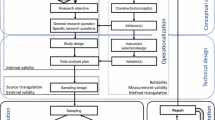Abstract
Most accounts of scientific and technological development stress the importance of quality judgments for particular technical fields. This study investigates social psychological and structural factors associated with such judgments for nineteen fields in nuclear waste and solar cell research. The results of the analysis indicate a tendency toward positive bias for fields in which researchers have been active, for this bias to be stronger in less innovative fields, and for elite membership to affect this bias in different ways depending on the nature of the system. In addition, there was no tendency for those with a high level of social contacts to others working in a field to display a positive bias, except in consensually innovative fields.
Similar content being viewed by others
References
W. HAGSTROM,The Scientific Community, Carbondale, Southern Illinois University Press, 1965.
J. COLE, S. COLE,Social Stratification in Science, Chicago, University of Chicago Press, 1973.
K. KNORR-CETINA,The manufacture of knowledge: an essay on the constructivist and contextual nature of science, Pergamon Press, 1981.
M. MULKAY, Action and belief or scientific discourse?Philosophy of the Social Sciences, 11 (1981) 163.
J. GASTON, Sociology of science and technology, in:A Guide to the Culture of Science, Technology, and Medicine, P. DURBIN (Ed.), Riverside, New York, Free Press, 1980.
R. MERTON,The sociology of science, Chicago; University of Chicago Press, 1973.
M. MULKAY, G. NIGEL GILBERT, S. WOOLGAR, Problem areas and research networks in science,Sociology, 9 (1975) 187.
I. MITROFF,The Subjective Side of Science: A Philosophical Enquiry into the Psychology of the Apollo Moon Scientists, Amsterdam, Elsevier, 1974.
C. FREEMAN, Economics of R&D, in:Science, Technology, and Society, I. SPIEGELRÖSING, D. DE SOLLA PRICE (Eds), Beverly Hills, Sage, 1977.
W. SHRUM,Organized Technology: Network and Innovation in Technical Systems, West Lafayette, Indiana, Purdue University Press, 1985.
M. MULKAY, The mediating role of the scientific elite,Social Studies of Sciences, 6 (1976) 445.
L. SKLAIR,Organized Knowledge: A Sociological View of Science and Technology, London, Paladin, 1973.
R. JOHNSTON, D. ROBBINS, The development of specialties in industrialized science,Sociological Review, 25 (1977) 87.
L. BUSCH, W. LACY,Science, Agriculture, and the Politics of Research, Boulder, Colorado, Westview Press, 1983.
S. BLUME,Towards a Political Sociology of Science, New York, Free Press, 1974.
J. PRIMACK, F. von HIPPEL,Advice and Dissent: Scientists in the Political Arena, New York, Basic Books, 1974.
S. COLE, The hierarchy of the sciences?American Journal of Sociology, 89 (1983) 111.
J. RAVETZ,Scientific Knowledge and its Social Problems, New York, Oxford University Press, 1971.
W. SHRUM, Scientific specialties and technical systems,Social Studies of Sciences, 14 (1984) 63.
B. HANNAY, R. MCGINN, The anatomy of modern technology: prolegomenon to an improved public policy for the social management of technology,Daedalus, 109 (1980) 25.
M. HORWITCH, Designing and managing large-scale public-private technological enterprises: a state of the art review,Technology in Society, 1 (1979) 179.
H. SAPOLSKY,The Polaris System Development: Bureaucratic and Programmatic Success in Government, Cambridge, Harvard University Press, 1972.
K. STUDER, D. CHUBIN,The Cancer Mission: Social Contexts of Biomedical Research, Beverly Hills, Sage, 1980.
L. SAYLES, M. CHANDLER,Managing Large Systems: Organizations for the Future, New York, Harper and Row, 1971.
Author information
Authors and Affiliations
Rights and permissions
About this article
Cite this article
Shrum, W. Quality judgments of technical fields: Bias, marginality, and the role of the elite. Scientometrics 8, 35–57 (1985). https://doi.org/10.1007/BF02025220
Received:
Issue Date:
DOI: https://doi.org/10.1007/BF02025220




